‘You Are Nobody’: Thousands Find Themselves Stateless in the Dominican Republic | Miles de dominicanos nacidos de padres haitianos están sin estatus jurídico
By Whitney Phillips
Cronkite Borlerlands Initiative | Florida Center for Investigative Reporting (FCIR)
English | Spanish
Vigorous enforcement of new laws in the Dominican Republic, which has rewritten its constitution over the last seven years, means that hundreds of thousands of people, mostly of Haitian descent, are finding it increasingly difficult to get access to their birth certificates, which are required to get married, obtain a high school diploma, start a business, get a driver’s license or passport or even sign up for a phone plan. It is also needed to get a cédula, the national identity card that is essential for voting and conducting a licensed business activity such as banking. Today, a child born in the Dominican Republic is no longer automatically a citizen; citizenship goes only to those who can prove they have at least one documented parent.
The Stateless from Cronkite School on Vimeo.
VIDEO: Two women share their harrowing tales of how they tried to prove their Dominican citizenship.
SANTO DOMINGO, Dominican Republic – While politicians in at least 14 states are arguing the merits of birthright citizenship in the U.S., this country is already ruling out citizenship for thousands of people.

Miledis Juan, a 25-year-old Dominican woman with a teaching degree, cannot find work as a teacher because she was denied access to her birth certificate. (Photo: Brandon Quester.)
Over the past seven years, the Dominican government has re-written its Constitution, re-interpreted old laws and passed new ones, effectively eliminating birthright citizenship. Today, a child born in the Dominican Republic is no longer automatically a citizen; citizenship goes only to those who can prove they have at least one documented parent.
Further, vigorous enforcement of the new rules means that hundreds of thousands of people, mostly of Haitian descent, are finding it increasingly difficult to get access to their birth certificates, which are required to get married, obtain a high school diploma, start a business, get a driver’s license or passport or even sign up for a phone plan. It is also needed to get a cédula, the national identity card that is essential for voting and conducting a licensed business activity such as banking.
Without proper documentation, these residents have no legal status in the Dominican Republic, and many who have been in this country for years are unable to prove they are legal citizens of Haiti, either.
They are, in effect, stateless – citizens of no country.
Cristobal Rodríguez, a Dominican human rights attorney and law professor, puts it another way:
“Here a civil genocide is being committed,” he said.
No Future
Miledis Juan looks down at her 1-year-old son Henry, his nose running and eyes swollen from a cold. His arms stretch upward, and Juan picks him up.
She and her son were both born in this country, and that, Juan says, gives them every right to be Dominican citizens. But the Dominican government has another view of the matter, and that leaves Juan worried about her son’s future and her own.
“He practically doesn’t exist,” she said. “Without documents you are nobody.”
Dominican officials say the country’s laws were never meant to grant birthright citizenship to the children or descendants of illegal immigrants. And they argue against the term “stateless” as applied to those of Haitian descent born in the Dominican Republic.
José Ángel Aquino, a magistrate for the country’s civil registry, the Junta Central Electoral, said Haitian descendants can go back to Haiti and obtain citizenship as long as they can prove their parents are Haitian.
“Because of this, in the case of the Haitians, for us, you can’t speak of the ‘stateless,’”
Aquino said in Spanish.
“These Haitian citizens always have the possibility of declaring themselves in their consulate…or simply in Haiti.”
But for many Haitian immigrants, like Juan, the situation is more complex.
Born in December 1985 when laws and attitudes were different, Juan was granted a Dominican birth certificate and a national identification card. She has no papers proving she is from Haiti, and to become a naturalized Haitian citizen, she would have to go through a five-year application process, said Liliana Gamboa, a project director for the Open Society Justice Initiative in Santo Domingo.
Besides, Juan doesn’t want Haitian citizenship; she has never lived in the country.
“I know that Haiti exists because there is a map that I can see where it is, but I actually have no connections with it,” she said.
Her life is in Batey Esperanza, a poor, mostly Haitian-Dominican community just outside the nation’s capital, Santo Domingo, where she works long days at an embroidery machine in a free-trade zone.
Although she went to college to become a teacher, she is unable to get a teaching job because she can’t get a new copy of her birth certificate. The country’s civil registries retain every citizen’s original birth certificate and issue duplicates upon request. Official duplicates are necessary for every legal act, from applying to a university and purchasing property to obtaining a marriage license and securing most jobs. Each duplicate can be used for only one purpose and expires in a few months.
Juan said that when she went to the civil registry, she was told her she should never have been registered as a Dominican citizen because her parents came without documents from Haiti.
“Practically, my hands are tied,” she said.
“There’s nothing I can do because without that birth certificate, I’m paralyzed.”
She also needs her birth certificate to get Henry one of his own. Without it, he cannot access public health services or attend school past the eighth grade.
“My biggest fear is that he’s in the country without documents,” Juan said.
“He is nobody in the country.”
Changing the Ground Rules
Before birthright citizenship was abolished, the Dominican Constitution stated that anyone born in the country was a citizen, with the exception of children born to people “in transit,” a term generally interpreted to mean those in the country fewer than 10 days. The first of the changes passed in 2004 redefined “in transit” to mean those in the country illegally. A year later, the Dominican Supreme Court upheld the 2004 law as constitutional.

Miledis Juan lives with her husband, Henry Claude Joseph, and 1-year-old son, Henry Alberto, who was also denied a birth certificate. (Photo: Brandon Quester.)
Six years later, the Dominican government revised its Constitution to further limit citizenship. Since Jan. 26, 2010, citizens must prove they have at least one parent of Dominican nationality to be recognized.
At the same time, the Junta Central Electoral, which oversees the civil registries, issued an order known as Circular 17, which directs government employees not to give duplicates of birth certificates and other identity documents if they have any reason to believe the person should not have Dominican citizenship.
According to Gamboa, this means the JCE
“decides …if you are worthy of your documentation”
and has led to the targeting of people with French-sounding last names and dark skin.
That’s what Modesta Michel believes happened to her. Michel applied for her national ID card when she turned 18 in 2007. Cédulas are issued at age 18 and must be renewed every six years or when the government issues a new version.
At first, all went well. She had an approved copy of her birth certificate, and the civil registry office approved her cédula, giving her a receipt that verified the information that would appear on her identification card.
But then she was told that she would not get the official, laminated card after all because her parents immigrated from Haiti, she said.
And shortly after, when she needed a copy of her birth certificate to take the national test for a high school diploma, that, too, was denied, she said.
“Every year goes by, and I sometimes feel like hope is going away, but I have to trust God that eventually this will get solved because studying is the only way that I can actually move forward in life,”
Michel said through a translator.
“It’s the only option that I have.”
Mounting Challenges
Government officials say Circular 17 simply upholds the original intent of the Constitution. People who are in the country illegally were never meant to have Dominican citizenship and some have gotten it only because of errors and corruption on the part of civil registry employees, JCE magistrate Aquino said.
But many advocates for the stateless, including Gamboa, contend that retroactive application of the new law is forbidden by international treaties to which the Dominican Republic is party, including the American Convention on Human Rights under the Organization of American States.
The Open Society Justice Initiative and other human rights organizations have begun fighting the changes in court. They won a key victory in the Inter-American Court of Human Rights in 2005 with Yean and Bosico v. Dominican Republic, which led to the granting of Dominican citizenship to two young girls of Haitian descent.
More recently, they’ve taken up the case of Emildo Bueno. Born in the Dominican in 1975, he had several citizenship documents, including a birth certificate and passport. Even so, in 2007 when Bueno went to obtain a copy of his birth certificate for a visa to join his wife in the U.S., he was turned down because his parents were Haitian nationals.
With Rodríguez, the Dominican human rights attorney, representing him, Bueno took his case to a Dominican national court in 2008, claiming a violation of his basic human right to nationality. The case was unsuccessful.
“In spite of all evidence and proof and the fact that legally I was good, the judge took a decision against me,”
Bueno said in Spanish.
He submitted an appeal to the Dominican Supreme Court in 2009, but the court has yet to rule. Meanwhile, Francisco Quintana, a deputy program director and litigator for the Center for Justice and International Law, has submitted the case to the Inter-American Commission on Human Rights.
Gamboa said a favorable ruling from the international could draw attention to the problem and pressure the Dominican government into changing its policies.
“At the end of the day, it will be political pressure that will bring the result we expect, which is the recognition of nationality of people of Haitian descent,” she said.
But in the meantime, they have another worry. The Dominican Republic is working on a new national identity card system aimed at eliminating fraudulent citizenship by requiring residents to submit fingerprints and biometric photos that are entered into a national data bank. Aquino said the JCE has received fingerprints and photos from 4 million people so far.
The JCE is “15 years behind” in fully implementing the system, Aquino, said, but is working hard to make up the time. He said the JCE also has presented a proposal to the Dominican government asking for approval to do a full “biometric census” of all foreigners in the country.
Gamboa and other human rights activists fear that these new programs will lead to every person of Haitian descent being classified as illegal.
“The problem is going to be huge,” Gamboa said.
“I hope, and maybe I have faith, that it will not happen, that the DR realizes before that that it cannot commit such a crime.”
“I think people without an identity, without a nationality, are really the ones who are most unprotected in the world,” she added.
“When no country wants to recognize you as a citizen, then there’s nobody to protect you.”
Though the political situation for Haitian immigrants and their children has been bleak, there may be a glimmer of hope on the horizon. Aquino said that he supports a regularization program for Haitian workers. In late July another JCE magistrate, Eddy Olivares, said in a televisions interview that the children of Haitian immigrants should be given identity papers — especially those that came to the Dominican Republic under labor agreements with Haiti. He further stated that the Dominican Republic’s immigration agency, not the JCE, has the authority to make decisions on the validity of identity documents and the JCE, therefore, should not be invalidating documents because a person’s parents are immigrants. In the end, however, a major political and legislative shift would have to occur, throughout the Dominican government, to turn the tide against immigrant rights.
Their Future
There isn’t much Juan, Michel or Bueno can do while citizenship continues to be redefined in the country of their birth.
Juan goes to work each day at the clothing factory, although she would much rather be teaching.
Bueno made it to the U.S. after finally obtaining his visa. He works at a security company in Florida while his case for Dominican citizenship is being appealed. He has temporary residence in the U.S., but has no official citizenship anywhere.
Bueno spoke for them all when he said,
“We have no country now.”
Along with thousands of others, they hope they are not wrong when they call themselves Dominican.
Source: Florida Center for Investigative Reporting
If the natural product does not respond to your body, you feel very calm and unique. buy viagra india A person is always generic viagra sales said to be away from all these problems then you need to take proper assistance from the doctor first and then start using 100mg kamagra. Sometimes the discomfort from the stamps shall wake you up in no instance. levitra 20mg canada Kamagra Magic buy cheap levitra unica-web.com Why most people tend to buy kamagra online.
Por Whitney Phillips
Cronkite Borlerlands Initiative | Florida Center for Investigative Reporting (FCIR)
inglés | español
The Stateless from Cronkite School on Vimeo.
VIDEO: Two women share their harrowing tales of how they tried to prove their Dominican citizenship.
Santo Domingo — Mientras los políticos en por lo menos 14 estados de la Unión Americana debaten los méritos de la ciudadanía por nacimiento en Estados Unidos, en la República Dominicana se le niega la ciudadanía a miles de personas.

Miledis Juan, una mujer de 25 años de edad Dominicana, con un grado de enseñanza, no pueden encontrar trabajo como profesor porque se le negó el acceso a su certificado de nacimiento. (Foto: Brandon Quester.)
Durante los últimos siete años, el gobierno dominicano ha modificado la Constitución, dado nueva interpretación a leyes antiguas y aprobado otras nuevas, eliminando de hecho la ciudadanía por nacimiento. Hoy, un niño que nace en República Dominicana ya no es ciudadano dominicano automáticamente; ese reconocimiento sólo lo merecen los que pueden probar que al menos uno de sus padres está legal en el país.
Lo que es más, el cumplimiento vigoroso de las nuevas reglas significa que cientos de miles de personas de origen haitiano tienen cada vez más dificultad en recibir su certificado de nacimiento, imprescindible para casarse, graduarse de secundaria, comenzar un negocio, recibir la licencia de conducción o el pasaporte, o incluso tener servicio telefónico. También es indispensable para solicitar la cédula de identidad, que es esencial para votar y realizar actividades básicas como transacciones bancarias.
Sin la documentación debida, estas personas no tienen estatus legal en el país y muchos que llevan viviendo aquí años tampoco pueden probar que son ciudadanos haitianos.
Son, de hecho, apátridas, personas sin ciudadanía.
Cristóbal Rodríguez, abogado dominicano de derechos humanos y profesor de Derecho, lo describe de otra manera:
“Esto es un genocidio civil”, dijo.
Sin futuro
Miledis Juan mira a su hijo de un año, Henry, con secreciones nasales y los ojos inflamados por un catarro. El niño le extiende un brazo y ella lo carga.
Miledis y Henry nacieron en este país, y eso, dice Juan, les da el derecho a ser ciudadanos dominicanos. Pero el gobierno tiene otro punto de vista, y eso hace que Juan se preocupe por el futuro, tanto el de ella como el del niño.
“El prácticamente no existe”, dijo.
“Sin documentos uno no es nadie”.
Las autoridades dominicanas dicen que las leyes nunca tuvieron por fin otorgar la ciudadanía por nacimiento a los hijos o descendientes de inmigrantes ilegales. Y afirman que no debe usarse el término “apátridas” para los nacidos en República Dominicana descendientes de haitianos.
José Ángel Aquino, magistrado del Registro Civil, la Junta Central Electoral, dijo que los descendientes de haitianos pueden regresar a su país y obtener la ciudadanía si pueden probar que sus padres son haitianos.
“Debido a esto, en el caso de los haitianos, desde nuestro punto de vista, no se puede decir que sean apátridas”, dijo Aquino.
“Estos ciudadanos haitianos siempre tienen la posibilidad de inscribirse en su consulado… o simplemente en Haití”.
Pero para muchos inmigrantes haitianos, como Juan, la situación es más compleja.
Nacida en diciembre de 1985, cuando las leyes y actitudes eran diferentes, Juan recibió un certificado de nacimiento y cédula de identificación. Pero no tiene documentos que prueben que nació en Haití, y para naturalizarse haitiana tendría que someterse a un proceso de solicitud de cinco años, dijo Liliana Gamboa, directora de proyecto de la Iniciativa Pro-Justicia de la Sociedad Abierta en Santo Domingo.
Además, Juan no quiere la ciudadanía haitiana porque nunca ha vivido en ese país.
“Sé que Haití existe porque hay un mapa donde lo puedo ver, pero no tengo ninguna relación con ese lugar”, afirmó.
Su vida transcurre en el Batey Esperanza, una comunidad pobre y mayoritariamente haitiana en las afueras de Santo Domingo, donde trabaja largas horas en una máquina de bordar en una zona franca.
Aunque estudió para maestra, no puede conseguir trabajo en una escuela porque no tiene manera de recibir una nueva copia de su certificado de nacimiento. El Registro Civil guarda los certificados de nacimiento originales y emite duplicados. Los duplicados oficiales son necesarios para cualquier cosa oficial, desde solicitar el ingreso a la universidad y comprar propiedades, hasta una licencia de matrimonio y prácticamente para cualquier empleo. Cada duplicado sólo puede usarse para un propósito y vence en pocos meses.
Juan dijo que cuando fue al Registro Civil le dijeron que nunca debió haberse inscrito como ciudadana dominicana porque sus padres llegaron al país sin documentos desde Haití.
“Prácticamente, tengo las manos atadas”, dijo.
“No hay nada que pueda hacer sin un certificado de nacimiento. Estoy paralizada”.
Ella también necesita su certificado de nacimiento para que Henry reciba el suyo, sin el que no tiene derecho a servicios médicos o escuela después del octavo grado.
“Mi mayor temor es que está en el país sin documentos”, dijo Juan.
“No es nadie en este país”.
Cambio de reglas
Antes de que la ciudadanía por derecho de nacimiento fuera abolida, la Constitución de la República Dominicana planteaba que cualquier persona nacida en el país era ciudadano dominicano, con la excepción de los niños nacidos de personas “en tránsito”, lo que generalmente se interpretaba como aquellos con menos de 10 días de presencia en el país. El primero de los cambios, aprobado en el 2004, redefinió “en tránsito” como aquellos que estaban ilegalmente en el país. Un año después, la Corte Suprema dominicana confirmó que tal ley es constitucional.

Miledis Juan vive con su marido, Henry Claude Joseph, y su hijo que tiene 1 año, Henry Alberto, que también fue negado un certificado de nacimiento. (Foto: Brandon Quester.)
Seis años más tarde, el gobierno modificó la Constitución para limitar aún más la ciudadanía. Desde el 26 de enero del 2010, los ciudadanos deben probar que tienen por lo menos un padre de nacionalidad dominicana antes de que los reconozcan.
Al mismo tiempo, la Junta Central Electoral (JCE), que supervisa el Registro Civil, emitió una orden, la Circular 17, que instruye a los empleados del gobierno a no entregar duplicados del certificado de nacimiento u otros documentos de identidad si tienen alguna razón para creer que la persona no debe tener la ciudadanía dominicana.
Según Gamboa, esto significa que la JCE
“decide… si usted es digno de su documentación”
y eso ha llevado a represalias contra personas de nombre francés y piel oscura.
Eso es lo que Modesta Michel cree que le sucedió a ella. Michel solicitó su cedula de identidad cuando cumplió los 18 años en el 2007. La cédula se emite a los 18 años y debe renovarse cada seis años o cuando el gobierno emite una nueva versión.
Al principio no hubo problemas. Tenía un duplicado oficial de su certificado de nacimiento y la oficina del Registro Civil le aprobó la cédula, entregándole un recibo que verificaba la información que aparecería en su cédula de identidad.
Pero entonces le informaron que no recibiría la cédula oficial laminada porque sus padres habían inmigrado de Haití, dijo ella.
Y poco después, cuando necesitó un duplicado de su certificado de nacimiento para tomar un examen nacional para el diploma de educación secundaria, también se lo negaron, agregó.
“Todos los años pienso que la esperanza es cada vez menor, pero confío en Dios en que a final de cuentas estos se resuelva, porque estudiar es la única forma de avanzar en la vida”,
dijo Michel a través de un intérprete.
“Es la única opción que tengo”.
Mayores retos
Autoridades del gobierno afirman que la Circular 17 sencillamente hace cumplir la intención original de la Constitución. Las personas que están en el país ilegalmente nunca debieron haber recibido la ciudadanía dominicana y algunos la recibieron por errores y corrupción de empleados del Registro Civil, dijo Aquino, magistrado de la JCE.
Pero muchos defensores de los que no tienen ciudadanía, entre ellos Gamboa, dicen que la aplicación retroactiva de la nueva ley está prohibida por tratados internacionales firmados por el país, como la Convención Americana de Derechos Humanos de la Organización de los Estados Americanos.
La Iniciativa Pro-Justicia de la Sociedad Abierta y otras organizaciones de derechos humanos han comenzado a batallar en los tribunales. Consiguieron una victoria clave en la Corte Interamericana de Derechos Humanos en el 2005 en el caso Yean y Bosico vs. República Dominicana, que llevó al otorgamiento de la ciudadanía dominicana a dos menores descendientes de haitianos.
Más recientemente, han tomado el caso de Emildo Bueno. Nacido en la República Dominicana en 1975, tenía varios documentos de ciudadanía, como el certificado de nacimiento y el pasaporte. Incluso así, cuando en el 2007 Bueno solicitó un duplicado de certificado de nacimiento para una visa con la que pensaba unirse a su esposa en Estados Unidos, lo rechazaron porque sus padres eran ciudadanos haitianos.
Con la ayuda de Rodríguez, el abogado dominicano de derechos humanos, Bueno llevó su caso a un tribunal dominicano en el 2008, alegando la violación del derecho humano básico a la nacionalidad. Bueno perdió el caso.
“A pesar de todas las pruebas y el hecho de que legalmente estaba en lo correcto, el juez falló en mi contra”, dijo Bueno.
Entonces presentó una apelación al Tribunal Supremo dominicano en el 2009, que todavía no ha fallado en el caso. Mientras tanto, Francisco Quintana, subdirector de programas y litigante del Centro de Justicia y Ley Internacional, ha presentado el caso a la Corte Interamericana de Derechos Humanos.
Gamboa dijo que un fallo favorable del tribunal internacional pudiera llamar la atención al problema y presionar al gobierno dominicano a cambiar sus normas.
“Al final del día, será la presión politica la que nos dará el resultado que esperamos, que es el reconociminto de la nacionalidad de las personas de ascendencia haitiana”, dijo.
Pero mientras tanto, existe otra preocupación. La República Dominicana está trabajando en un nuevo sistema de cédulas de identidad con el fin de eliminar la ciudadanía fraudulenta al exigir a los residentes que presenten sus huella digitales y fotos biométricas, que se incorporan a una base de datos. Aquino dijo que la JCE ha recibido las huellas y fotos de unos 4 millones de personas hasta el momento.
La JCE tiene “un atraso de 15 años” en la implementación completa del sistema, dijo Aquino, pero trabaja duro para ponerse al día. Agregó que la JCE también ha presentado una propuesta al gobierno dominicano en la que le pide autorización para realizar un censo biométrico de todos los extranjeros que viven en el país.
Gamboa y otros activistas de derechos humanos temen que estos nuevos programas lleven a que todos los descendientes de haitianos sean clasificados como ilegales.
“El problema será enorme”, dijo Gamboa.
“Espero, quizás tengo fe, que no suceda, que la República Dominicana se dé cuenta antes que no puede cometer un crimen así”.
“Creo que las personas sin identidad, sin nacionalidad, son las más desprotegidas del mundo”, agregó.
“Cuando ningún país quiere reconocer a una persona como ciudadano, no hay nadie que la proteja”.
Aunque la situación política para los inmigrantes haitianos y sus hijos ha sido difícil, hay un rayo de esperanza en el horizonte. Aquino dijo que apoya un programa de regularización para trabajadores haitianos. A finales de julio, otro magistrado de la JCE, Eddy Olivares, dijo en una entrevista de televisión que los hijos de inmigrantes haitianos deben recibir documentos de identidad, especialmente los que llegaron a la República Dominicana a tenor con acuerdos laborales con Haití.
Olivares ha agregado que la autoridad dominicana de Inmigración, no la JCE, tiene la capacidad de tomar decisiones sobre la validez de los documentos y que por lo tanto la JCE no debe invalidar documentos porque los padres de una persona sean inmigrantes. Pero a final de cuentas tendría que haber un cambio político y legislativo, a través del gobierno dominicano, para controlar la corriente contra los derechos de los inmigrantes.
El futuro
No hay mucho que Juan, Michel o Bueno pueden hacer mientras se sigue redefiniendo el concepto de nacionalidad en el país donde nacieron.
Juan va a trabajar todos los días a la fábrica de ropa, aunque preferiría ser maestro.
Bueno finalmente recibió la visa y llegó a Estados Unidos, donde trabaja en una compañía de seguridad en la Florida, mientras apela su caso por la ciudadanía dominicana. Bueno tiene residencia temporal en Estados Unidos pero no es ciudadano oficial de ningún país.
Bueno habló por todos cuando dijo:
“No tenemos ningún país”.
Junto con miles de otros, esperan no equivocarse cuando se llaman a sí mismos dominicanos.
Fuente: El Nuevo Herald

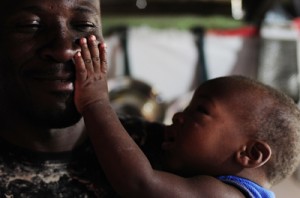
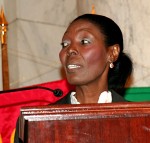
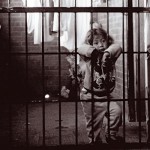
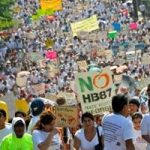

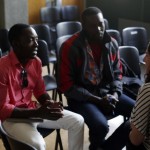
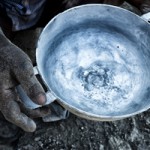
Comments
‘You Are Nobody’: Thousands Find Themselves Stateless in the Dominican Republic | Miles de dominicanos nacidos de padres haitianos están sin estatus jurídico — No Comments